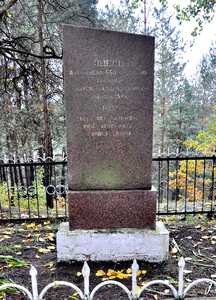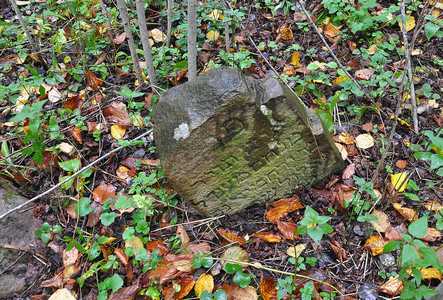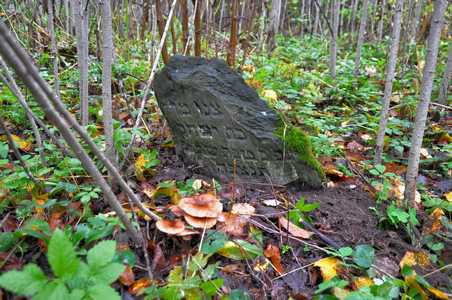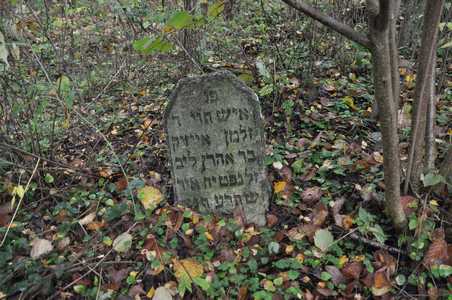TIME OF THE GREATEST ORDEAL
Obchuga is a village in Krupki district. In the 19th - early 20th centuries it was a shtetl Obchugi in Senno district, Mogilev province.
In 1897, 412 (45.9%) Jews inhabited the shtetl.
In the summer of 1941, Obchuga was occupied by the Wehrmacht forces. In October 1941, several Jews were killed, while in May the number grew to 194-440 Jews.
Anna Markovna and Fyodor Ignatievich Skums lived in Obchuga before the war. They worked as teachers in a local school.
From the memoirs by Anna Markovna Skums
Published on May 29,2010.
When the war began, the local authorities prohibited group gatherings, telling people: “Don’t push the panic, the Germans won’t come to the shtetl.” They banned leaving the shtetl. The daily newspaper reported about captured prisoners, a great deal of military hardware, and fighting the enemy off our frontier. But, as it soon became clear, everything turned out to be lies. There were rumors that the Germans were bombing Minsk and would occupy it soon. The local authorities gathered male teachers and assigned night duties to catch the German spies (rumors had it that the Germans were dropping paratroopers who killed communists and Soviet officials in charge). People went on duties unarmed. I even made a joke, telling my husband: “Take at least a stick.” Of course, no one detained anybody.
 The place
The place
of shooting
the Jews of Obchuga.
The time of
the monument erection
is unknown.
A few days later the “conquerors” on motorcycles invaded the settlement. And then everyone revealed their true colours. There suddenly came up two teachers of our school, physicist Mikitinsky and historian Kovalev. Either they were not given call-up orders or they deliberately failed to appear in the military enlistment office. The latter seems more probable. They were glad to meet the Germans and joined them. There appeared some secret persons, who began helping the Germans to establish the “new” order. They immediately started doing away with the Jews. Each fence in the shtetl had a written order attached: “Don’t talk to Yids, don’t greet them, don’t let them in your house, in your bath, don’t sell them anything. Otherwise, you’ll be shot.”
There emerged a lot of scums who wanted to get rich at the expense of someone else's good, at the expense of someone else's blood. Here the true human nature was revealed, the deepest, often hidden, character traits surfaced. Friendship and kinship went through the hardest ordeals. There were frequent cases of husbands betraying their wives and wives betraying their husbands. Here are a few cases. In Obchuga I worked together with a teacher of elementary grades named Anna Vasilievna (I don’t want to mention her last name). Her husband was a Jew, a tailor by profession. They had two children.At the beginning of the war Anna Vasilievna and her family moved to her native village. Her husband was hiding in a secret place. She got tired of taking trouble over it and, wishing to settle down to a quiet life, brought the policemen and showed her husband’s hiding place. He was caught and hanged in front of the entire village. In the same Obchuga there lived the Bakanovsky family. The head of the family was a Belarusian, a paramedic. He died shortly before the war. His wife, Olga Yakovlevna, was Jewish, worked as a midwife. She had been christianized before the Revolution. She had three children. The elder daughter, Lyuba, taught German at school. Her two sons, Adam and Vitaly, were schoolchildren. They had nothing Jewish, but the close relatives of her husband insisted that they were Jews and were subject to elimination. They were killed, while their house and property were taken by the relatives. Yet, most people sympathized with the Jews, though they couldn’t help them in reality. Even a fleeting contact with the “inferior race” threatened with death, and not everyone was able to show heroism.
Still, cases of real courage and true generosity happened everywhere. And often they were strangers and even unknown people who showed them. In Holopenichi, Minsk region, there lived Pyotr Ivanovich Samtsevich and his wife Berta Samuilovna. They both were teachers. Berta Samuilovna was Jewish. They had three children. At the outbreak of the war Pyotr Ivanovich went to the front. Berta Samuilovna took the children to her husband’s sister. The sister disclosed the children to the Nazi and they were shot.
Berta Samuilovna was saved by an Orthodox priest, Father Vasily Verzhbolovich. And there were many such examples.
... I was alone among strangers, I was expecting a baby. Several days after the establishment of the “new power” in Obchuga a car drove up to the house where I was staying. The Germans, accompanied by the policemen, burst into the room and took most of my belongings. I was staying at the house of the elderly Jews. A German soldier bayonet poked in my stomach and roared with laughter, while the policemen said: “That’s all, it’s the end of your kingdom.” My hosts huddled in a corner and were trembling with fear. The Germans thrust the old man by the hair and shouted: “Jude, kaput!”
When they finally left, I went to the window and froze in horror: right in front of the house, facing the wall of the neighboring house, there stood three old Jewish men, and the Germans were pointing their guns at them. There followed fire and the innocent victims fell down dead. My hardest days of loneliness and hunger began. The locals had at least something in stock, and I had nothing.


 The Jewish cemetery in Obchuga shtetl.
The Jewish cemetery in Obchuga shtetl.
The only grocery store in the shtetl was looted. People carried sacks of flour, sugar, salt and other foodstuffs. The Jews were banned to approach the shop. What did I have to do? I was pregnant and all acquaintances were afraid to communicate with a Jew.
I took a decision to go to Borisov, to my mother, sisters and brother. It was in August, 1941. Together with my hosts’ daughter and her ten-year-old son, the residents of Borisov, we set off.
My hosts’ daughter and her son had left the city during the bombing to come to her parents, hoping that the Germans would soon be fight off and they would return to their home. However, making sure that there was no salvation at her parents’ place, she was returning to Borisov.
Photo by Alexander Litin
|

